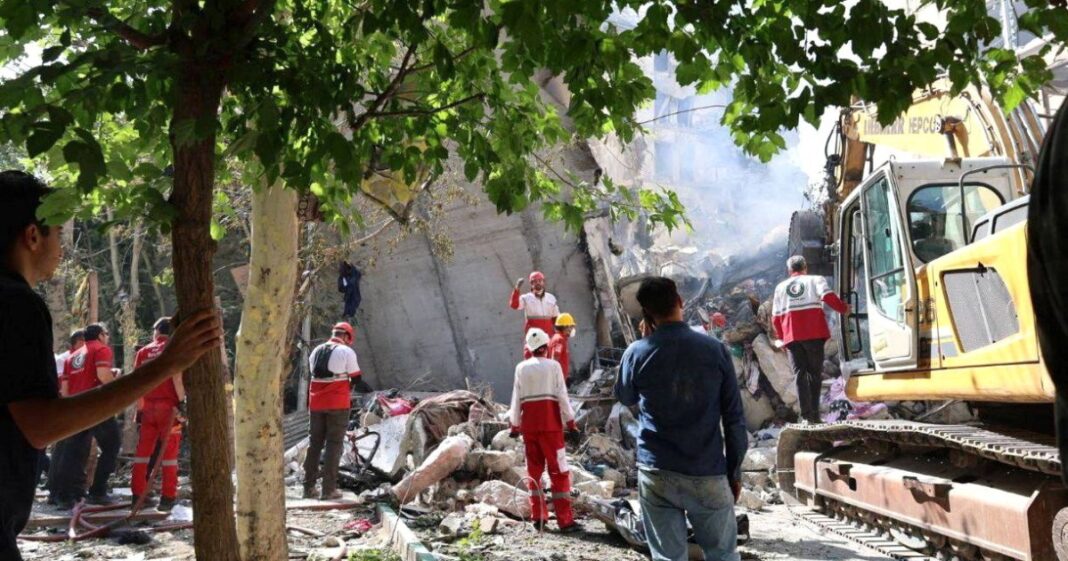Israel’s attacks on Iranian nuclear and military sites mark a significant escalation in regional tensions, and may reshape Tehran’s nuclear calculus.
The coordinated strikes killed several senior military and security officials, including the head of Iran’s military Mohammad Bagheri, and the head of the Islamic Revolutionary Guard Corps (IRGC), Hossein Salami.
“One of the concerns in attacking the nuclear sites has been that setbacks could lead Iran to reconstitute their operations with a more determined effort to obtain a nuclear deterrent,” said Ali Vaez, an expert on Iran for the International Crisis Group (ICG).
Sceptics validated
Iran has long had an internal debate among reformers and hardliners about whether to reach an agreement with the United States on its nuclear programme.
“[The attacks] likely confirmed the position of hardliners and ultra hardliners who said that Iran was wasting its time to try and negotiate with the West … they said Iran can never negotiate from a position of weakness and appeasement,” said Reza H Akbari, an analyst on Iran and the Middle East and North Africa Programme Manager at the Institute for War and Peace Reporting.
Talks between Iran and the US have suffered from a large trust deficit after President Donald Trump unilaterally pulled out of the nuclear deal between Iran and several Western nations, known as the Joint Comprehensive Plan of Action (JCPOA), during his first term in 2018.
The JCPOA was orchestrated by Trump’s predecessor Barack Obama and endorsed by the United Nations Security Council in 2015.
It aimed to monitor Iran’s nuclear programme to ensure it did not approach weaponisation levels. In exchange, some sanctions were lifted from Iran.
While the deal was lauded as an achievement of diplomacy, Israel disapproved of the JCPOA. Ten years later, the US and Iran appeared interested in striking another similar deal.
The former ostensibly did not want to get dragged into a regional war as tensions mounted across the Middle East, while the latter was again looking for much-needed sanction relief.
But Israel’s strikes on Iran, which were reportedly planned months in advance and with US approval, have scuttled any diplomatic solution in the short term, said Akbari.
“It’s hard to imagine that someone in the shoes of Iran’s supreme leader [Ali Khamenei] is not taking the side of hardliners after this,” he told Al Jazeera.
No other options
In response to Israel’s strikes, Iran has launched drones and ballistic missiles at Israel, with some hitting targets on the ground.
In the past, Iran’s deterrence against external aggression relied primarily on its self-described “Axis of Resistance”.
The axis consisted of powerful armed groups across the region, such as Lebanon’s Hezbollah, as well as Syria under former President Bashar al-Assad.
However, Hezbollah’s capabilities were degraded significantly during the peak of its recent war with Israel, which lasted from September to late November last year.
Al-Assad’s fall in December, the culmination of a more than decade-long civil war in Syria, also compromised Iran’s ability to resupply Hezbollah through Syria, as it used to do.
Trump is now exploiting Iran’s weakness by urging it to capitulate to a deal that would see it give up its nuclear programme, said Michael Stephens, an expert on regional response to Iran’s nuclear programme with the Royal United Service Institute (RUSI), a defence think tank.
On Friday, Trump posted on Truth Social that Iran must make a deal before there is “nothing left” of the country and that the next Israeli attacks will be even “more brutal”.
Later that evening, Israel carried out more air strikes on Iran’s military sites and nuclear facilities.
“There are no good options for [Iran] really,” said Stephens.
“Either Khamenei … orders his negotiators to compromise on the nuclear file or … he holds firm [and] more sites are hit and further targeted assassinations of high-level officials take place,” he told Al Jazeera.
“Either way, if Iran decides to sprint towards a bomb, it’s going to be very, very difficult to do that now,” he added.
Last stand
Despite Iran’s military weakness compared with the US and Israel, it is wary of giving up its nuclear programme, analysts told Al Jazeera.
Negar Mortazavi, an expert on Iran with the Centre for International Policy (CIP), said Iranian officials have long referred to the fate of former Libyan leader Muammar Gaddafi, who agreed to give up his nuclear weapons programme in exchange for US sanction relief in 2003.
The deal came after the US President George W Bush had launched his so-called “War on Terror” after the September 11, 2001, attacks, which led to the invasion and prolonged occupation of Iraq and Afghanistan.
At the time, Bush warned his partners and foes in the region that they were either “with us or against us”.

Eight years after Gaddafi gave up his nuclear programme, the US backed a pro-democracy uprising in Libya, which spiralled into an armed rebellion and led to Gaddafi’s overthrow and eventual death.
“The [Libya] scenario is something that Iran has taken notice of, and they don’t want to go down that path,” Mortazavi explained.
She added that Iran may likely pull out from the JCPOA and try to quickly expand its nuclear programme in reaction to Israel’s ongoing assault.
“Just how far and how soon Iran will expand its nuclear programme is unclear,” Mortazavi told Al Jazeera.


